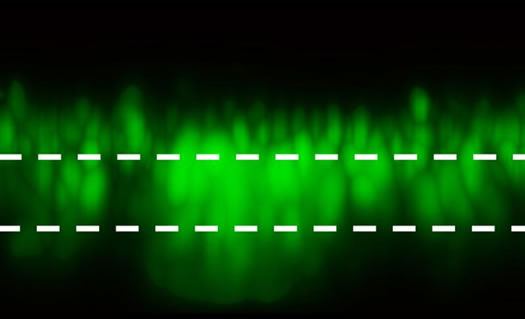Bacteria from space (OK, they're originally from Earth, but they went to space)

Bacteria were sent into space and they came back glowing green. (OK, not really: these are micrographs of the side view of the unusual structures formed by the bacteria sent into space.)
From the Annals of Didn't This All Go Horribly Wrong in the Movie Version: Researchers from RPI report that bacteria sent into space behave in unusual ways. From an RPI News article:
Recent findings provide important evidence of spaceflight's effect on the behavior of bacterial communities and represent a key step toward understanding and mitigating the risk these bacteria may pose to astronauts during long-term space missions.
The research team, led by Rensselaer faculty member Cynthia Collins, sent the experiment into orbit aboard Atlantis' STS-132 mission in May 2010 and its STS-135 mission in July 2011. Samples of the bacteria Pseudomonas aeruginosa were cultured for three days in artificial urine. The space-grown communities of bacteria, called biofilms, formed a column-and-canopy structure not previously observed on Earth. Additionally, biofilms grown during spaceflight had a greater number of live cells, more biomass, and were thicker than control biofilms grown under normal gravity conditions.
Bad sci-fi jokes aside, this is an interesting topic. Biofilms are common in nature -- That plaque on your teeth? Biofilm. -- and their formation is based on some remarkable bacterial communication (bacteria have been heavily invested in nanotech since, you know, forever). As the RPI article alludes to, biofilms play a role in hospital-acquired infections. In fact, that's probably one of the reasons the researchers picked Pseudomonas aeruginosa -- it's a common hospital infection and is associated with infections from devices such as catheters (yeah, now the urine part is probably making sense, too). A lot of medical devices are already hard to thoroughly clean, and sticky biofilms make the job even harder.
So, sending these microbes into space -- and bringing them back to Troy -- could help scientists better understand how biofilms form. And that, in turn, could help people here on Earth -- or if/when we send people to Mars.
Because spaceships sound kind of germy.
image: Rensselaer Polytechnic Institute
Say Something!
We'd really like you to take part in the conversation here at All Over Albany. But we do have a few rules here. Don't worry, they're easy. The first: be kind. The second: treat everyone else with the same respect you'd like to see in return. Cool? Great, post away. Comments are moderated so it might take a little while for your comment to show up. Thanks for being patient.
... said KGB about Drawing: What's something that brought you joy this year?